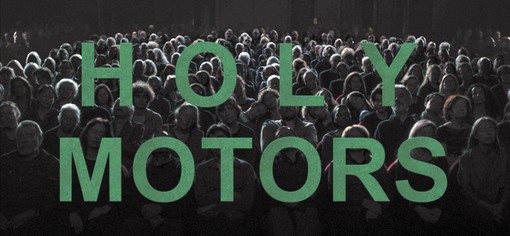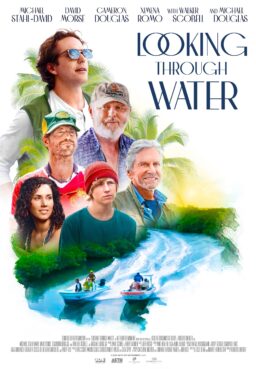But what really matters is the Muriels. You know, that time-honored annual movie award that is not named after Bette Davis’s Uncle Oscar, but after co-founder Paul Clark’s guinea pig. Throughout the month of February (the 6th through the 23rd), the winners have been announced, as you know because you’ve been regularly clicking on the Muriels link right here on Scanners. Anyway, you know what “Argo” can do; the Muriel voters, on the other hand, chose to give the year’s top prize to what, for me, was obviously the most rewarding movie experience of the year: Leos Carax‘s “Holy Motors.”
Now, I’m not saying the membership of the Academy of Motion Picture Arts and Sciences got everything wrong. (Seth MacFarlane was sure wrong, but he did pretty much exactly what the producers hired him to do. And, admit it, to come across as simultaneously unctuous and nasty is a pretty remarkable feat. His recycling of Bob Hope’s and Johnny Carson’s old jokes, though, missed their essential irony: Those guys knew when they were telling bad jokes, and that was essential to the jokes. Unlike the disastrous James Franco, host MacFarlane appeared unaware of how bad his material was — he’s the maker of “Family Guy,” after all — though at least he invested in it some of the time.)
Where was I? Oh yes, credit where due: The nominees for Best Actress were almost all really good, although I haven’t seen the Naomi Watts tsunami movie and, OK, maybe that cute little nine-year-old girl who The Onion called the c-word on Twitter precisely because nothing could be more inappropriate, transgressive and gratuitously offensive* seemed just a smidgen too adorably confident, on- and off-screen. (She’s just been cast as the lead in a re-tooled version of the 1977 Broadway musical “Annie,” so there you are.) But, hell, she’s nine. Solipsism is her world. Where were your agents and publicists booking you when you were nine? Plus, she wants to be a dentist, and I like that.
But, really, the Muriels: Let’s compare lists. Here were the Academy membership’s choices for the nine best movies of 2012, some of which have yet to be released in home video formats:
“Amour” “Argo” “Beasts of the Southern Wild” “Django Unchained”
“Life of Pi” “Lincoln” “Les Miserables”
“Silver Linings Playbook” “Zero Dark Thirty“
Overall, really, I don’t think that’s such a bad list for the MOR tastes of the Oscar clique — especially compared to last year, when the only Brad Pitt movie that might have made my own list was “Moneyball.” And, of course, at least four of these films’ directors have to be snubbed because that’s the way the Academy planned it. You know: math. Even Harvey Weinstein can’t spin it.
Now let’s look at the Muriels (ranked by votes):
1) “Holy Motors”
2) “Moonrise Kingdom”
3) “The Master”
4) “Zero Dark Thirty”
5) “The Turin Horse”
6) “The Deep Blue Sea”
7) “Django Unchained”
8) “Lincoln”
9) “Looper”
10) “Amour“
There are four titles on both lists (“Amour,” “Django Unchained,” “Lincoln” and “Zero Dark Thirty”), but which set of movies do you think is more likely to make a lasting impression on you — to affect you deeply, to take you to places you’ve never been, to show you things either didn’t know or didn’t know you knew? Provided that you like that sort of thing. I’m asking — not answering for anyone but myself. Art and entertainment are personal, not ballot-based, and I would never expect to be in full concurrence with any poll-based ranking — but I at least considered every one of those Muriel winners for my own personal Top 10 list (which I have yet to annotate for publication). And, best of all, those who follow the Muriels know that individual voters have written essays about each of these films at co-founder Steve Carlson’s blog, Our Science is Too Tight, which is where the above links will take you.
Me, I wrote about the Best Director winner this year: Leos Carax. Here’s what I said (ever-so-slightly amended/expanded):
The two best-directed, most thrillingly cinematic movies I saw in 2012 were Leos Carax’s “Holy Motors” and Michael Haneke’s “Amour”** — both films in which most of the “action” takes the form of conversations held in compartments — apartments, car interiors, empty buildings. Mostly, they just show people sitting around talking, singing, living, dying. But there’s not much in the way of superheroes, chases, fights (gun- or fist-), explosions and all that. Yet, moment-by-moment, I found them to be dynamic, electrifying experiences. Their cumulative power comes from their organic seamlessness. In a climate where so many films feel like they’ve been pieced together by committees from unrelated fragments (because they have been), these movies are striking because of the wholeness — the relentlessness, you might even say — of their vision.
Both films are also from writer-directors, which isn’t surprising because it’s hard to imagine the writing and directing of them as separate processes. “Holy Motors” begins with a man (played by Carax himself) getting out of bed and walking into a forest, which is a mural on a wall. His finger is the key that unlocks an invisible door. He passes through it, appears to be in the corridors of a ship at sea, and wanders into a movie theater. From the balcony, he sees a child running down the aisle; later, a dog runs in slow-mo toward the camera, like the fever-dream phantom of death in Buñuel’s “Los Olvidados.”
Then we see a man leaving his house in the morning, a house that looks something like a nautical vessel. His children bid him goodbye and he climbs into a white limo (see also David Cronenberg’s “Cosmopolis“), where his driver informs him that he has nine appointments for the day. The movie is structured as a to-do list, a daily calendar. The car drives around Paris, and for each appointment the man prepares himself with make-up and costume to assume a particular role: a homeless old lady, a special effects actor, a subterranean madman (aka M. Merde), a dying old man, an assassin… Each is the star of his/her own movie (genres include crime thriller, science-fiction, monster movie, coming-of-age drama, musical, romance…); each is an actor playing a role; and each is the same person. The idea is inseparable from the execution. As in all great movies, the images, the words, the performances, the themes — they’re all one.
“Holy Motors” is about movies — about making them and watching them and living them — and it’s about acting, not just for the camera but the roles we all play every day, the faces we put on and take off for different audiences, and for ourselves. No movie surprised and delighted me more in 2012; none made me laugh harder (dig that accordion entr’acte!) or gave me such melancholy chills. As you watch it, “Holy Motors” seems to wind down to its terminal destination (“FIN” — “The End”), slowly dying before your eyes — and that’s not a criticism, but a fitting description of the long day’s journey into night it spans. (“La Dolce Vita” and “Mulholland Dr.” — other movies about playing roles, assuming identities and staging scenes — have a similar draining-yet-exhilarating effect.) It’s a movie that captures what it feels like to be fully alive and dying at the same time — which is the state we’re all in, more or less. And no film made me clap and shout with such joy over being alive and getting to witness something as moving and exuberant, coherent and surprising, eloquent and off-the-wall crazy as “Holy Motors.”
PS – Yes, the headline is also a Resnais pun.
– – – – –
* The Brits use the word differently. In my opinion, the best public use of this taboo term was the famous quotation from Elton John printed in The New Yorker in the 1990s, referring to a tabloid libel lawsuit he had won: “They can say I’m a fat old cunt, they can say I’m an untalented bastard, they can call me a poof, but they mustn’t tell lies about me.”
** With Steven Spielberg a close third for “Lincoln,” for many of the same reasons.











